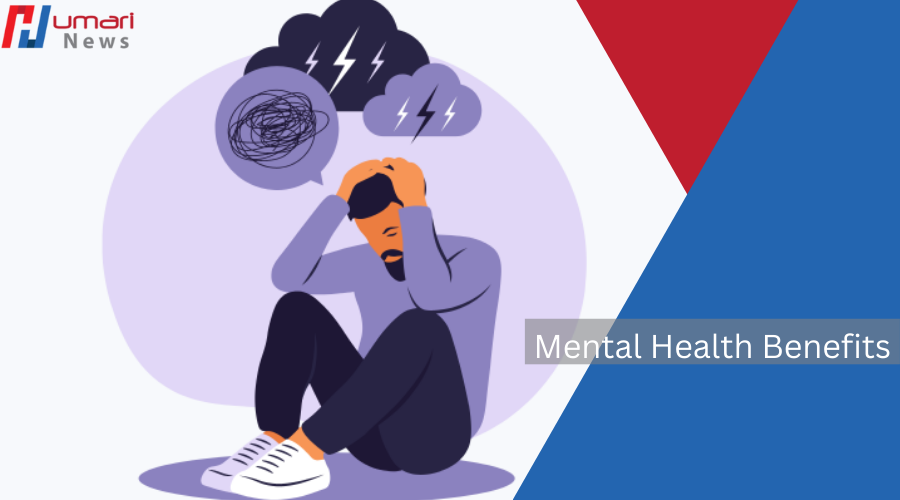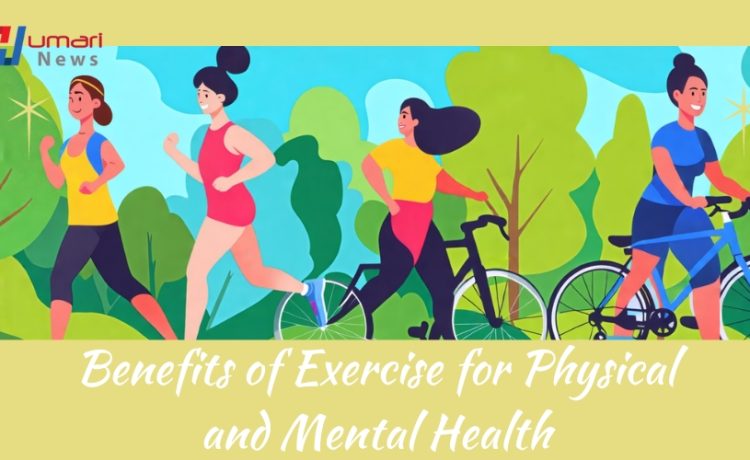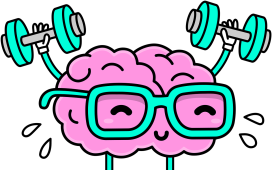Exercise is one of the most effective ways to improve overall health and well-being. Regular physical activity offers a wide range of benefits, both for the body and the mind.
In addition to helping maintain a healthy weight and reducing the risk of chronic diseases, exercise plays a crucial role in enhancing mental health, reducing stress, and boosting mood.
In this article, we will explore the numerous benefits of exercise for physical and mental health.
1. Improved Cardiovascular Health

Regular aerobic activities, such as walking, running, cycling, or swimming, strengthen the heart and improve circulation. This leads to:
- Lower blood pressure: Exercise helps to regulate blood pressure, reducing the risk of hypertension.
- Improved cholesterol levels: Physical activity raises high-density lipoprotein (HDL), also known as “good” cholesterol, and lowers low-density lipoprotein (LDL) or “bad” cholesterol.
- Reduced risk of heart disease: Regular exercise decreases the likelihood of developing heart disease, heart attacks, or strokes by improving overall heart function.
2. Weight Management and Obesity Prevention
Maintaining a healthy weight is essential for reducing the risk of many chronic diseases, such as type 2 diabetes, hypertension, and certain types of cancer. Exercise has a significant role in weight management by:
- Burning calories: Engaging in physical activity helps burn calories, which contributes to weight loss or weight maintenance.
- Building muscle mass: Strength training exercises, such as lifting weights or resistance training, increase muscle mass, which boosts metabolism and helps maintain a healthy weight.
- Reducing body fat: Regular exercise reduces excess body fat, promoting lean muscle mass and a healthier body composition.
3. Strengthened Muscles and Bones
Exercise is essential for maintaining and building strong muscles and bones. Weight-bearing exercises, such as running, walking, and resistance training, help:
- Build muscle mass: Exercise strengthens muscles, improving overall physical performance and reducing the risk of injury.
- Increase bone density: Weight-bearing activities stimulate bone growth, increasing bone density and reducing the risk of osteoporosis and fractures, especially in older adults.
4. Enhanced Flexibility and Balance
Incorporating activities such as yoga, Pilates, or stretching into your fitness routine improves flexibility and balance, which are vital for mobility and preventing falls, particularly as we age.
Flexibility exercises help lengthen muscles, improving the range of motion and reducing stiffness. Balance exercises strengthen the core and stabilizing muscles, reducing the likelihood of falls and enhancing coordination.
5. Mental Health Benefits

Benefits of exercise for physical and mental health also have profound effects on overall health. Regular physical activity can significantly improve mood, reduce anxiety, and combat depression. Here’s how:
- Endorphin release: Physical activity stimulates the production of endorphins, which are natural chemicals that promote feelings of happiness and well-being. This is often referred to as the “runner’s high.”
- Reduced anxiety and stress: Exercise helps lower stress hormone levels, such as cortisol, while promoting relaxation. Activities like yoga, deep breathing exercises, or light cardio can calm the mind and reduce anxiety.
- Improved self-esteem: Regular exercise can boost self-confidence by improving body image, fitness levels, and overall health, contributing to a sense of accomplishment.
- Better sleep: Regular physical activity improves sleep quality by helping you fall asleep faster and enjoy deeper sleep cycles, which are essential for mental and physical recovery.
6. Cognitive Benefits
Exercise benefits the brain in several ways, from improving memory to enhancing concentration and cognitive performance. Physical activity increases blood flow to the brain, delivering oxygen and essential nutrients that support cognitive function. Exercise can:
- Boost memory: Aerobic exercises, in particular, have been shown to improve memory and reduce the risk of cognitive decline, such as dementia or Alzheimer’s disease.
- Enhance focus and productivity: Regular physical activity improves mental clarity, focus, and productivity by promoting better brain function.
- Delay age-related cognitive decline: Exercise helps maintain brain health by preserving neural connections and promoting the growth of new brain cells, reducing the effects of aging on the brain.
7. Reduced Risk of Chronic Diseases
Regular exercise is one of the most effective ways to lower the risk of developing chronic diseases such as:
- Type 2 diabetes: Exercise improves insulin sensitivity and helps regulate blood sugar levels, reducing the risk of developing type 2 diabetes.
- Cancer: Regular physical activity has been linked to a lower risk of certain cancers, such as breast, colon, and lung cancer.
- Hypertension: As exercise improves heart health and reduces blood pressure, it helps lower the risk of high blood pressure and its complications.
8. Social and Emotional Benefits
Exercise, especially in group settings, fosters social interactions and a sense of community. Participating in team sports, fitness classes, or group runs allows individuals to connect with others, providing emotional support and motivation. This social aspect of exercise can improve mental health, reduce feelings of loneliness, and promote emotional well-being.
Exercise is a powerful tool that benefits both the body and the mind. From strengthening muscles and bones to boosting mood and cognitive function, regular physical activity is essential for overall health and well-being.
By incorporating exercise into your daily routine, you can enjoy better physical health, improve mental clarity, reduce stress, and enhance your quality of life. Whether it’s walking, swimming, or practicing yoga, making time for regular physical activity is one of the best investments you can make for your physical and mental health.







